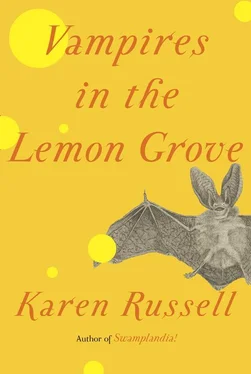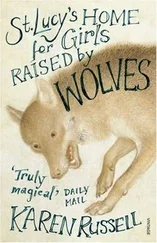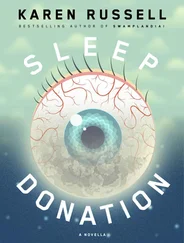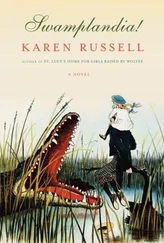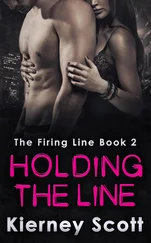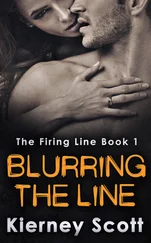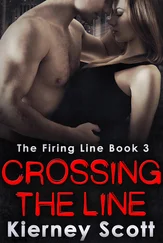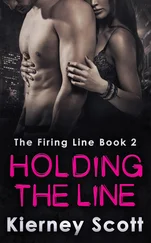Perhaps in his next body Rutherford will find his wife, Lucy.
The runaway
One day, at the end of an otherwise unremarkable afternoon, James Garfield makes it over the Fence. Nobody sees him jump it. Fitzgibbons and the girl come in to groom the horses, and Rutherford B. Hayes overhears them talking about it. Shouting, really: “Well, I’ll be sweetly pickled! A runaway!” Fitzgibbons’s face looks blood-pulsed, flushed from the search. But his eyes crinkle up with delight. Sunup, sundown, Fitzgibbons follows the same routine. Surprise is a rare and precious feeling on the farm.
“How do you like that, angel? We’ve never had a runaway before …”
“But where did he run to, Uncle Fitzy?”
Fitzgibbons grins down at her. “I don’t know.”
Fitzgibbons doesn’t seem at all put out by the loss. Something about the way that he squints into the green mist beyond the Fence makes Rutherford think that Fitzgibbons is rooting for Garfield’s escape.
“Do you think that Garfield will return?” James Buchanan asks now, looking nervous. “Because he must return, for the good of the Barn. We elected Garfield to represent the mallards. Who is going to speak out on behalf of the mallards at our next Convention? You can’t just shirk a duty like that. You can’t just abandon your post!”
Apparently, you can , thinks Rutherford. The other presidents all stare at the dark and rippling air in James Garfield’s vacant stall.
The next incumbent
The following morning, Fitzgibbons comes in early to muck out Garfield’s stall. The Barn buzzes with speculation about the next president to join the ranks. Millard Fillmore is nervous enough for all of them. “Do you think he will be an agreeable sort of man? Do you think he will be a Republican? Why, what if he’s just a regular stud horse, and not a president at all …?”
Nobody answers him. Every man is scheming in the privacy of his own horse-body. Andrew Jackson, a stocky black quarter horse stabled next to Rutherford, can barely contain his ambitions in his deep ribs. You can feel his human cunning quiver from the fetlock up. “Whoever the newcomer is, I will defeat him,” he says. Jackson has been lonely for an adversary. Every spring he runs uncontested for the office of Spokeshorse of the Western Territories. Many of the presidents have sworn themselves in to similarly foolish titles: Governor of the Cow Pastures, Commanding General of the Standing Chickens. They reminisce about their political opponents like old lovers. There’s a creeping emptiness to winning an office that nobody else is seeking.
At noon, Fitzgibbons leads the new soul in. He’s a thoroughbred with four white socks and a cranberry tint to his mane. Buchanan recognizes him right away: “John Adams!”
Adams lets out a whinny so raw with relief that it dislodges sleeping bats from the rafters: “You know me!” Adams woke up just yesterday, in the dark, close trailer that he assumed was a roomy coffin. “Excepting that I could see sunshine through the slats,” he says in a voice still striped with fear. He seems grateful when Buchanan gives him a friendly bite on the shoulder.
“Are we dead?”
Ten horses nod their heads.
“Is this Heaven?”
It’s an awkward question. Ears flatten; nostrils dilate as wide as a man’s fist. Rutherford unleashes a warm, diplomatic sneeze to ease the tension.
“That depends,” shrugs Ulysses. A series of bleary battle-weary lines cross-hatches his black nose. “Do you want this to be Heaven? Does this look like Heaven to you?”
Adams studies the dark whorls of mildew, the frizz of lofted hay, his own hooves. He goes stiff in the ears, considering. “That also depends. Is Jefferson here?”
Jefferson is not. There are many absences in the Barn of unknown significance: Washington, Lincoln, Nixon, Harrison. The presidents haven’t arrived in the order of their deaths, either. Woodrow Wilson got here before Andrew Jackson, and Eisenhower has been here since the beginning.
“But we can’t live out our afterlives as common beasts!” Adams’s eyes shine with horror. “There must be some way back to Washington! I am still alive, and I am certainly no horse.”
There is always this period of denial when new presidents first arrive in the Barn. Eisenhower still refuses to own up to his own mane and tail. “I’m not dead, either, John Adams,” Eisenhower says. “I’m just incognito. The Secret Service must have found some way to hide me here, until such time as I can return to my body and resume governance of this country. I can’t speak for the rest of you, but I’m no horse.”
“ ‘I’m no horse!’ ” Andrew Jackson mimics. He butts Eisenhower with the flat of his head. “What the Christ are you, then?”
“The thirty-fourth president of the United States.” Eisenhower shakes burrs from his tail in a thorny maelstrom.
Adams is rolling his eyes around the Barn, on the verge of rearing. His gums go purple: “Gentlemen, we must get out of here! Help me out of this body!” By the looks of things, Adams will be a stall-kicker. He kicks again and again, until splinters go flying. “We need to alert our constituents to what has befallen us. Gentlemen, rally! What’s keeping us here? The doors to the Barn stand wide open.”
“Rutherford,” says Ulysses. He stands sixteen hands high and retains his general’s authority. “Why don’t you show our good fellow Adams the Fence?”
The Fence
Rutherford and Adams trot out of the dark Barn into a light, silvery rain. The fence wood is rotted with age, braided through with wild weeds. Each sharpened post rises a level four feet tall, midway up the horses’ thick chests. Fitzgibbons put it up to discourage the fat blue geese from flight.
“This is the Fence? This is what keeps us prisoners here? Why, I could jump it this moment!”
Rutherford regards Adams sadly. “Go ahead, then. Give it a try.”
Adams charges the Fence. His forelegs lift clean off the ground as he runs. At the last second, he groans and turns sharply to the left. It looks as if he is shying away from the edge of a cliff. He shakes his small head, stamps and whinnies, and charges again. Again he is repelled by some invisible thicket of fear. Sweat glistens on his dark coat.
“Blast, what is it?” Adams cries. “Why can’t I jump it?”
“We don’t know.” The presidents have tried and failed to get over the Fence every day of their new lives. Rutherford thinks it’s an ophthalmological problem. A blind spot in the mind’s eye that forces a sharp turn.
“How did James Garfield manage it? And where did he run to?”
Garfield’s hoofprints disappear at the edge of the paddock. The fence posts point at the blue sky. Adams and Rutherford stare at the trackless black mud on the other side of the Fence. There are two deep crescents where Garfield began the jump, and then nothing. It’s as if Garfield vanished into the cool morning air.
“Good question.”
Animal memories and past administrations
Woodrow Wilson is giving speeches in his sleep again: Ah, ah, these are very serious and pregnant questions , Woodrow mumbles, his voice thick with an old nightmare. Upon the answer to them depends the peace of the world.
Poor Wilson, Rutherford thinks, watching as he addresses the questions of a phantom nation. Wilson paws at the stall floor as he dreams, his lips still moving. The world is drafting new questions, new answers, without him.
In his own dreams, Rutherford never returns to the White House. Instead his memory takes him back to his Ohio home of Spiegel Grove, back to the rainy morning of his death. Unlike the other presidents, Rutherford’s dreams find him paralyzed, powerless. He remembers watching the moisture pearl on his bedroom window, the crows lining the curved white rail of his veranda. Lucy’s half of the huge pine bed had been empty four years. In the end, divested of all decisions, he had only an old thick-waisted nurse opening his mouth, filling it with tastes, urging him to swallow. Boyhood tastes, blood-pumpkin stew and sugared beets. His son and his youngest daughter were two smudges above the bedside. The boy quietly endeavored to blink good-bye. Then Rutherford’s throat began to close, shutting him off from all words, and he felt himself filling with silence. The silence was a field of cotton growing white and forever inside him. Rutherford wasn’t afraid to die. My Lucy , he remembers thinking, will be waiting for me on the other side .
Читать дальше
